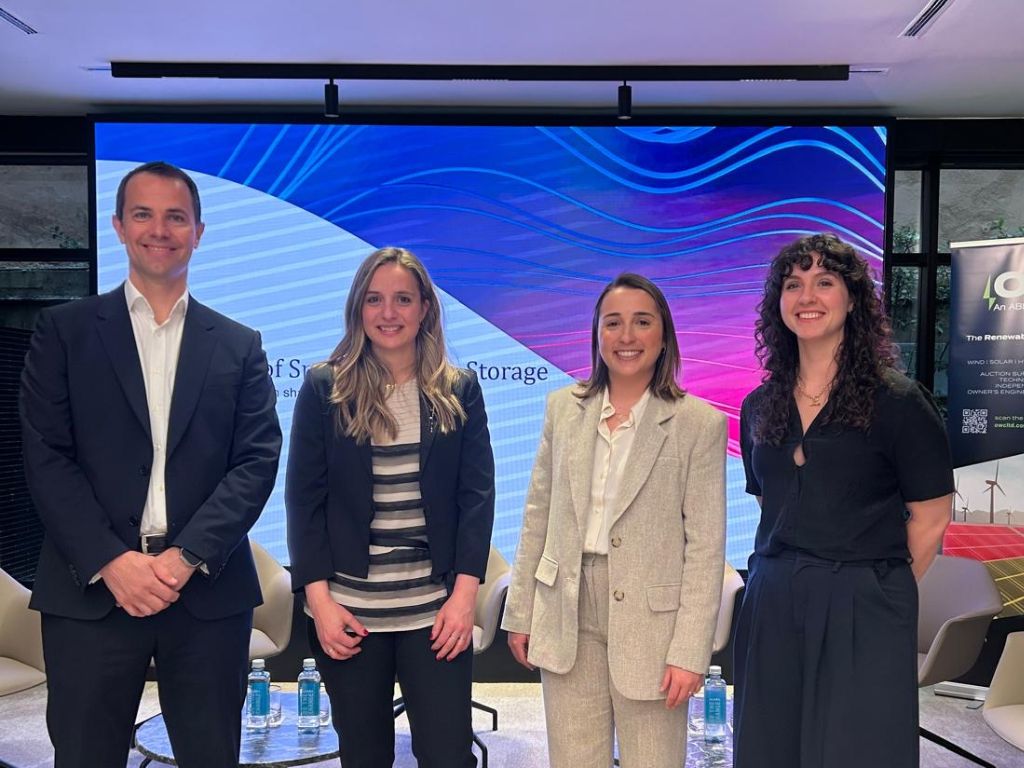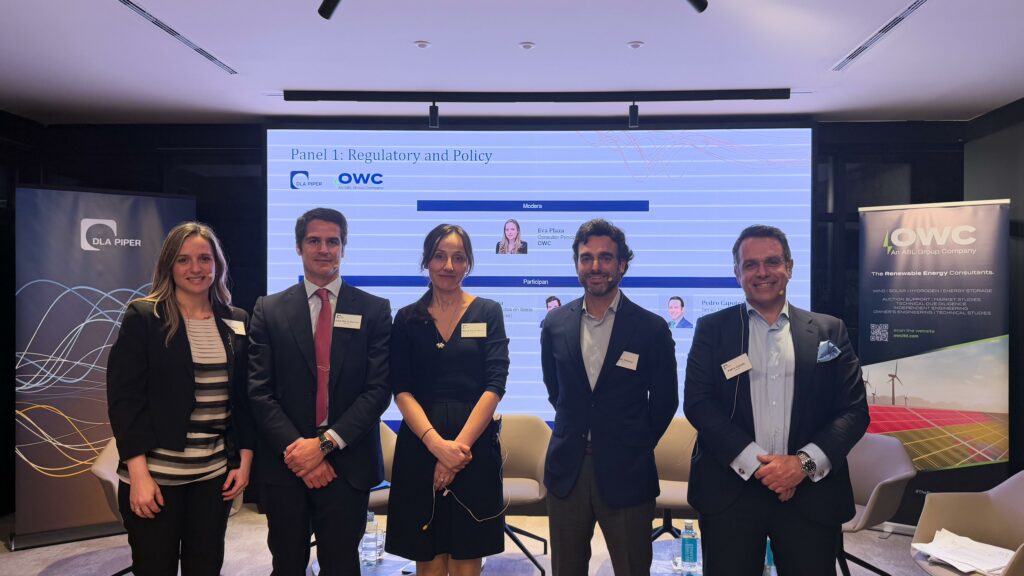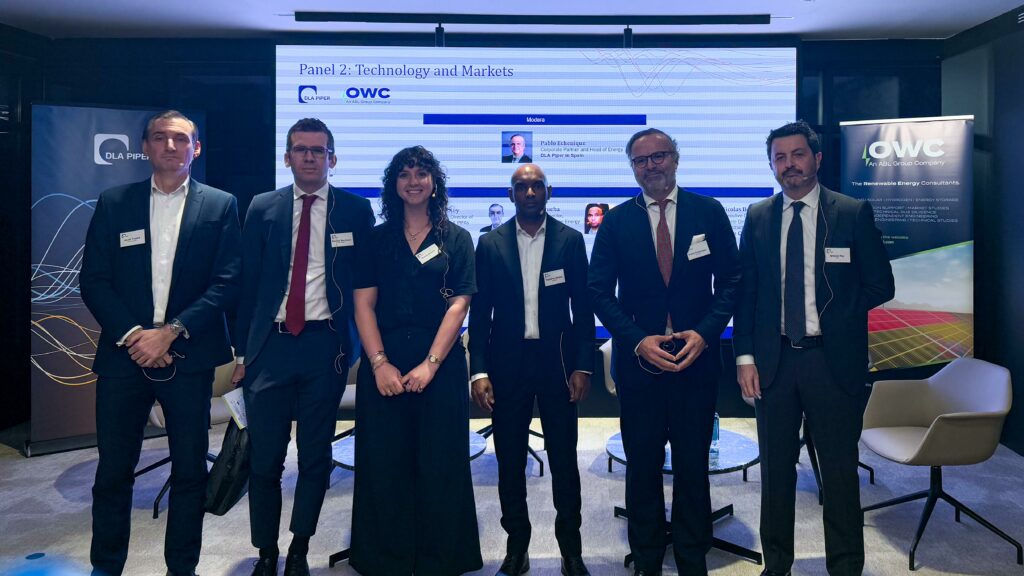The future of energy storage in Spain
Experts gather at the offices of DLA Piper in Madrid, Spain to discuss the role of energy storage (BESS) in Spain, facing the challenges of the new energy era, in an event organised together with OWC.
Energy storage has become a fundamental building block for the energy transition in Spain. The need for sound technical solutions and an adequate regulatory framework is increasingly evident, especially in a context where long-term financing remains a challenge. Despite the implementation of incentives in 2024, doubts remain as to their effectiveness and whether they will be sufficient to boost the sector.

As part of this debate, the technical consultancy OWC and the international law firm DLA Piper organised a meeting in which, through two panels of experts, the strategies and innovations that are shaping the energy transition in Spain were debated.

The event was opened by Ana Pirrone, OWC Country Manager, who highlighted the urgency of developing storage infrastructures to achieve the country’s energy objectives.
“Storage is an immediate need in Spain, with a projected demand of 22.5 GW, of which 10 GW would correspond to batteries (BESS). However, for these projects to be viable, clear regulation and access to viable financing are essential,” she said.
The first hybrid storage auction, held in 2023 through PERTE, was a milestone, but there are still unanswered questions on how to make these projects as profitable as possible. In this regard, more than 17 GW of battery projects are in the pipeline, evidencing the growing interest in the sector and the need for further progress on regulatory and investment measures.
The first panel, moderated by Eva Plaza, Principal Consultant at OWC, addressed the regulatory and financial perspectives of energy storage. María Santa María, Iberia Project Manager (BESS & Green Hydrogen) at BayWa r.e., highlighted the strength of the sector and its great potential for development, although she warned about the need for robust technical infrastructures to ensure grid stability. José María Barrios, Partner in charge of Public and Regulatory Law at DLA Piper in Spain, analysed the regulatory risks, pointing out that, although the current regulations provide an adequate basis, they could be insufficient to guarantee the economic viability of the projects.

Miguel Solana, Co-Founder and Managing Partner of Alter 5, elaborated on the challenges of battery hybridisation, noting that its complexity varies depending on the stage at which it is incorporated into an energy project. He said that while large utilities are leading the way in hybridisation, stand-alone projects are attracting increasing interest from developers. Pedro Capote-Martin, Senior Director – Structured Finance Europe & Energy Origination at Nord LB, underlined the importance of co-development and reinvestment structures as key tools to manage uncertainty in the sector and facilitate access to finance.
The second panel, moderated by Pablo Echenique, Partner in charge of Energy at DLA Piper in Spain, focused on market developments and new investment models. Aimee Besant, Head of Energy Storage at OWC, highlighted the role of storage in the optimisation of the energy market, pointing out that hybridisation is an increasingly common strategy in solar projects. Ignacio Rey, Head of Origination at FRV, addressed the challenges of PPAs in the context of storage, explaining how increasing market flexibility is transforming the valuation of these contracts.

Javier Trueba, Managing Director of Structured Finance Energy at Grupo Santander, analysed the impact of storage on the financing of energy projects, underlining the importance of finding appropriate financial models to mitigate the associated risks. Vijandren Naidoo, Storage Director at Brookfield, mentioned supply chain issues as a key obstacle to the implementation of new technologies. Finally, Nicolas Bordeaux, Executive Director – Private Debt – Infrastructure at Prime Capital AG, highlighted that, despite regulatory and financial challenges, Spain remains an attractive market thanks to its consolidation and growing investor interest.
Internationally, countries such as Germany have launched storage auctions, foreseeing an additional 2.2 GW plus 1.2 GW by 2028. France, for its part, has 800 MW, although only 40 MW are currently connected. In the UK, reforms are underway to improve the integration of storage into its energy system. These experiences highlight the importance of adopting policies to facilitate the development of the sector in Spain.



In conclusion, experts agree that energy storage in Spain has a promising future, but its consolidation will depend on the evolution of the regulatory framework, the overcoming of economic barriers and access to financing, in addition to the fact that the adoption of co-investment models and the experience of other markets can serve as a reference to guarantee the success of this key technology in the energy transition.
Considering Spain’s 22.5 GW target of energy storage by 2030, OWC brings deep expertise to the Spanish market, drawing on experience from over 85+ global BESS projects – amounting to 25+ GW of storage capacity!
Opening our OWC Madrid office in 2024, we remain committed to supporting the country’s energy transition, with the success of this event underscoring the wider industry appetite for collaboration.
Learn more about our experience below!
